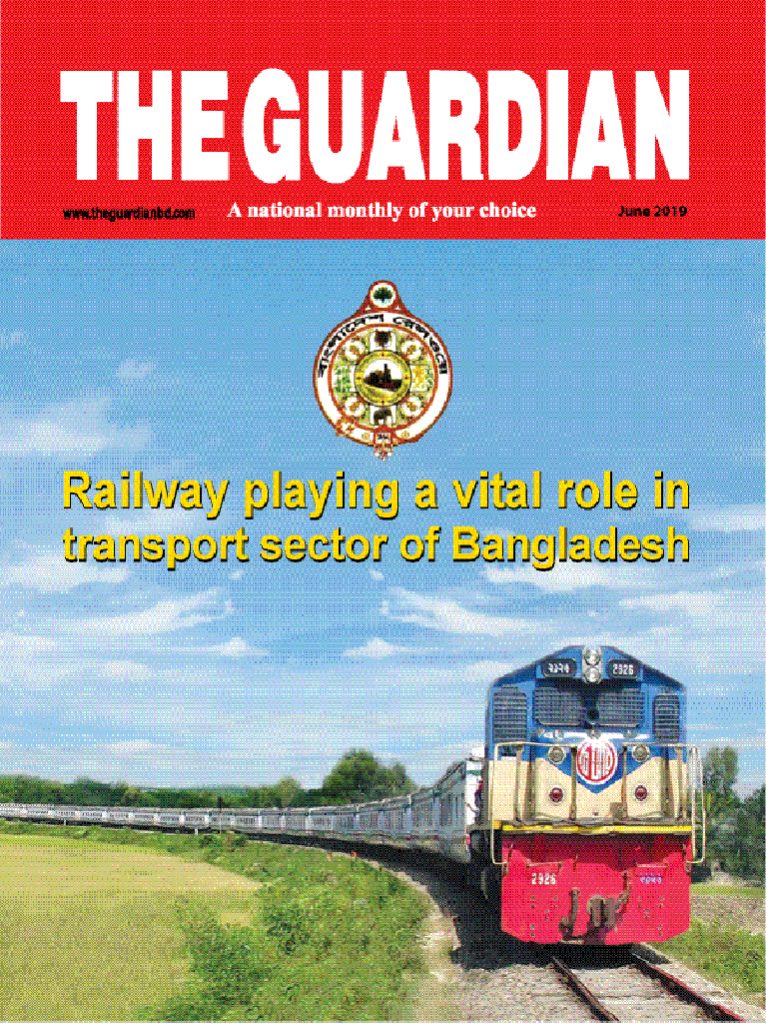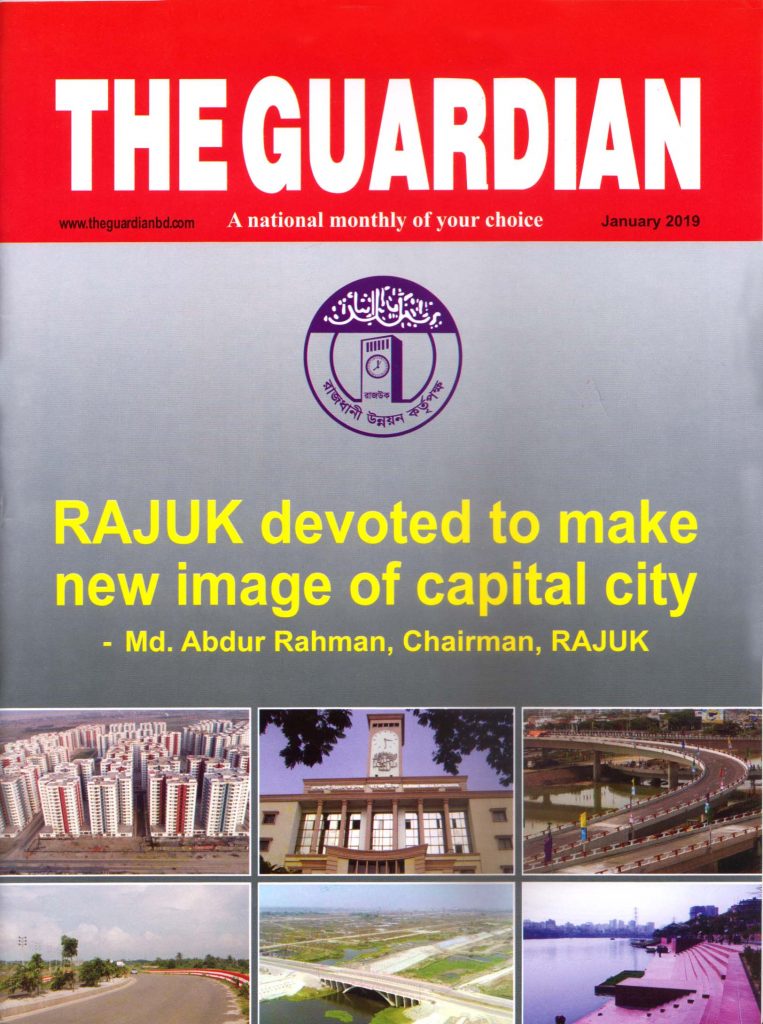The history of Railway Audit Directorate (RAD) dates back to 1930 when Railway Accounts was established in British period and through passing over different tiers of institutional aspects and journey, finally on 29.09.1995 as per order issued by the Comptroller and Auditor General of Bangladesh this directorate was named as the Railway Audit Directorate, said Nurun Nahar, Director General, Railway Audit Directorate, in an exclusive interview with The Guardian.
The Director General, in this context, further said that since then Railway Audit Directorate is conducting audit on the activities and performances of the offices under Ministry of Railways and always dedicated for the service of the people.
Terming audit as a process to investigate the effectiveness of public administration and spending of public money, she believes that the later generation officers have scope to work for the country through department and this department offers the development of career and future for the later generation.
In this context, the Director General wants young professionals to work in audit department because the greatest wealth and strength of any nation is its youth. A committed Director General, Ms Nahar said that they are here for the service of the people of Bangladesh and call upon them for their assistance and support to carry out their duties expectedly, so that they can be able to attain their goal and contribute something in the process of prosperity and glory of Bangladesh.
In an exclusive interview, the Director General replied to several questions, covering the entire activities, problems, potentials, contributions and future plans of Railway Audit Directorate including the initiatives and cooperation of the present government in strengthening the directorate as well as the audit activities in the country. Her4 deliberations are quite interesting, informative and educative as well. The valuable excerpts of her interview are presented here for The Guardian readers at home and abroad:
The Guardian: Please give us a short introduction to the founding history of Railway Audit Directorate.
Director General: Railway Audit Directorate is one of the 10 Audit Directorates under the command of Office of the Comptroller and Auditor General (OCAG), Bangladesh. In the British period, it was named as “Chief Auditor Eastern Bengal Railway”. It was established along with Railway Accounts in 1930. It was separated from Railway Accounts in 1936 according to the Act of 1935. As per government order issued in 1974, the office was renamed as “Office of the Director General, Railway Audit Directorate”. In 1985, the name was again changed into “Office of the Director, Railway Audit” according to the report of Enam Committee.
Finally, on 29.09.1995 as per order issued by the Comptroller and Auditor General this office was named as “Office of the Director General, Railway Audit Directorate”. This office used to conduct audit over the Railway Division of Ministry of Communication. In 2011, Railway Division has been upgraded into the Ministry of Railways. After that Railway Audit Directorate is conducting audit on the activities and performances of the offices under Ministry of Railways.
The Guardian: In this context would you discuss the powers and functions of Audit Directorate?
Director General: Subject to the provision of the constitution of Bangladesh 128(1): The public accounts of the Republic and of all courts of law and all authorities and officers of the Government shall be audited and reported on by the Auditor-General and for that purpose he or any person authorized by him in that behalf shall have access to all records, books, vouchers, documents, cash, stamps, securities, stores or other government property in the possession of any person in the service of the Republic.
Functions of the Directorate
w To execute field audit over the organizations of Bangladesh Railway.
w To prepare, compile, implement and oversight the audit planning and audit program.
w To audit the appropriation accounts of Bangladesh Railway.
w To finalize draft para and to send the manuscript of audit report to the CAG for final approval.
w To prepare and handover the audit report to the CAG so that it could be presented to the Public Accounts Committee and the honorable president of Bangladesh by CAG.
w To arrange all related papers required by the Public Accounts Committee.
w To maintain regular contact with the Principal Accounting Officer or Secretary of Ministry of Railway for audit correspondence.
w To take appropriate steps for the settlement of audit observations.
w To give proper training and briefing to the audit teams and monitor their work.
w Overall performing properly to establish accountability and transparency in government functions.
The Guardian: Would you also discuss the organizational structure of the directorate?
Director General: Railway Audit Directorate is headed by Director General, who is a grade-III officer. There is one Director in the head office and three Deputy Directors.
The Guardian: And say whether this directorate has any branch or unit across the country?
Director General: The head office of this directorate is in Dhaka. There are two other branches (Regional Offices) of this office in Chittagong and Rajshahi. The regional offices are headed by Deputy Directors.
The Guardian: In this context, would you mention the number of officers and staffs currently working under this directorate?
Director General: The granted manpower for this office is 211. The total number of officers and staff is currently working here is 133. Among them no. of officers is 21 and no. of staffs is 112.
The Guardian: Would you tell us the modern facilities are available at this directorate for its officers and staffs to perform their duties well?
Director General: In this directorate there are computer facilities for everyone. Each officer has a desktop computer for his/her official work. In each section there are computers to perform the section work. Regular training on computer is provided here to every officer and staff. Here, we have enough printers, photocopier, scanner and Internet connections so that we can keep pace with digitalization of work. We have 10 audit teams who perform field audits. Each of the team members are capable of using computers and the software AMMS (Audit Monitoring and Management System). Before starting the field work each team is provided with a laptop computer and a modem. They send updates about the audit observations through Internet using the AMMS software. The whole program is monitored by senior officials of the directorate. Senior officials are also provided with laptop computers.
The Guardian: Would you reflect the problems and limitations of this directorate?
Director General: The problems and limitations of this directorate are
w Lack of manpower.
w Small number of senior officials.
w Lack of proper knowledge about audit procedure as auditors are mostly freshers and they have little experience about field audit before.
w Employees come from different disciplines so there is lack of expertise on audit.
w Often experienced employees are transferred and some work remains undone or half-done. This also lead delay in preparing audit report.
w Communication problem is a major problem when audit teams are doing field audit.
w Delay in the audit correspondence from the auditee is the most unavoidable problem while dealing with the settlement of audit observations. A number of audit observation remain unsettled each and every year. And day by day this number is growing.
w Problems in management of old files and audit evidences.
w Audit follow up is a major problem because the employees are changing.
w Lack of proper IT knowledge.
The Guardian: And what steps are being taken to solve those?
Director General: Some effective steps are being taken to solve these problems:
w Regular in house training on IT skill and office management.
w Providing employees with necessary items they require.
w Sending employees to different training academies so that they can acquire more knowledge and experience.
w Regular attachments are done for the newcomers to the field audit under supervision of experienced senior employees.
w Monthly meetings are held regularly in which employees can mention their particular problems so that effective measures can be taken time to time.
w Proper supervision and monitoring is maintained in this directorate.
The Guardian: Please inform us about the achievements of this directorate.
Director General: An issue based audit report of Railway Audit Directorate is included in the annual report of OCAG 2013. The title of the report is “An issue based audit report of C&AG on land management and charging fees related accounts for the financial year 2007-08, 2008-09 & 2009-10.” The related amount in the audit observations is 155.51 crore taka.
This directorate always follows the directions of OCAG and performs duties properly. In case of any knowledge of serious financial irregularities in newspaper or from personal information, this directorate always takes immediate action. Recently, based on a newspaper feature (Daily Manabjamin, dated: 3rd June, 2014) one of our audit teams has been successful to issue audit observations of taka 45, 04, 858 on the office of DEN, Lalmonirhat.
The Guardian: Would you disclose the future plans of this directorate?
Director General: Achievement of plans calls the success of an organization. We have some long term and short term plans for the betterment of our organization. But overall, we want to improve the quality of our audit because quality audit will reflect the effectiveness of audit on public administration. We have a plan to establish a website of our Directorate. It will cover our up-to-date activities and performances. We already have a data base for all of our audit observations. But we have a plan to upgrade it. We want to focus more and more on the issues of public interest in our coverage of work.
The Guardian: In this context, would you say that what cooperation you are getting from government, especially from the concerned ministry to implement your future plans?
Director General: Our supervising authority is OCAG. They give us sufficient support for our directorate. We are directly concerned with Ministry of Railways. But this ministry is in fact our auditee party. So there is a situation of adversary between the ministry and us. In spite of the situation, we maintain a supportive relationship with the ministry. On a regular basis, we attend tri-party meeting and keep up audit correspondence.
The Guardian: In the end, please give your valuable message for your later generation officers and also for the people of Bangladesh.
Director General: Railway Audit Directorate is always dedicated for the service of people. Audit is a process to investigate the effectiveness of our public administration and spending of public money. I want to tell the later generation officers that there is scope for work for the country in our department. Working in this department offers the development of your career and future. We want young professionals in our department because the greatest wealth and strength of any nation is its youth. And for the people of Bangladesh I would like to say we are here for your service. We call for your assistance and support. It will help us to attain our goal and we will able to contribute something in the process of prosperity and glory of our country.
Profile of Nurun Nahar
Nurun Nahar, present Director General of Railway Audit Directorate belongs to 1984 batch (6th batch) of BCS Audit &Accounts Cadre. Before her joining here she worked as a research officer in Urban Development Directorate in the Ministry of Works. She is working in different offices of Audit Department in different capacities.
Nurun Nahar was born in 1959 in a renowned family of Khulna city. She has a sound academic background. She is an MSC in Geography from the University of Dhaka. Besides this, she did CIPFA (Diploma level) course from London in 1995.
In her long distinguished career she served both the audit and accounts side of the cadre. She started her career from Civil Accounts and worked as Chief Accounts Officer in different CAO offices like in CAO (Home Affairs), CAO (Foreign Affairs) and CAO (Works). She served the Defence Accounts, mostly as Deputy Finance Controller in Army, Air Force and as Senior Finance Controller in Navy, Army and Air Force. This is her second tenure as DG Railway Audit. Previously she worked as Director General in Civil Audit and Defence Audit.
Ms Nahar is a well-travelled civil servant. She has already travelled India, China, Australia, Canada for training purpose. She has audited Bangladesh Mission of Tokyo. In her personal life she is married. Her husband Sheikh Saleque is a retired Govt. officer and they are blessed with three children. Only one son Shakib Saleque is an army officer, twin daughters Lamia Arony is a BBA student at IBA and Samia Aboni is an Architecture student at BUET.















